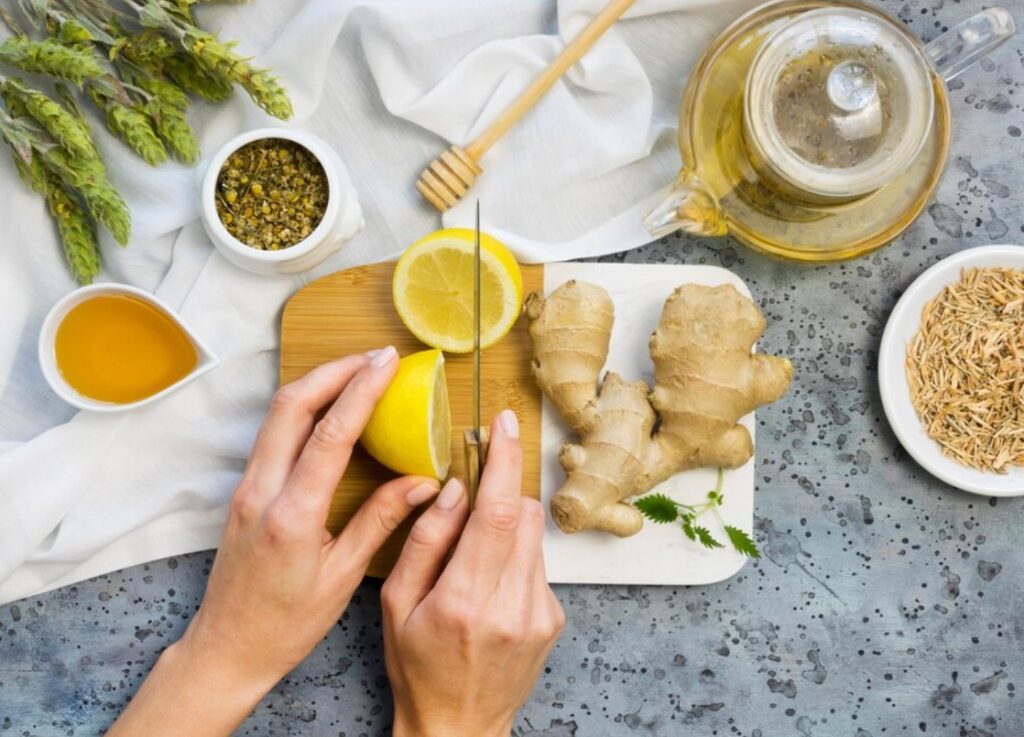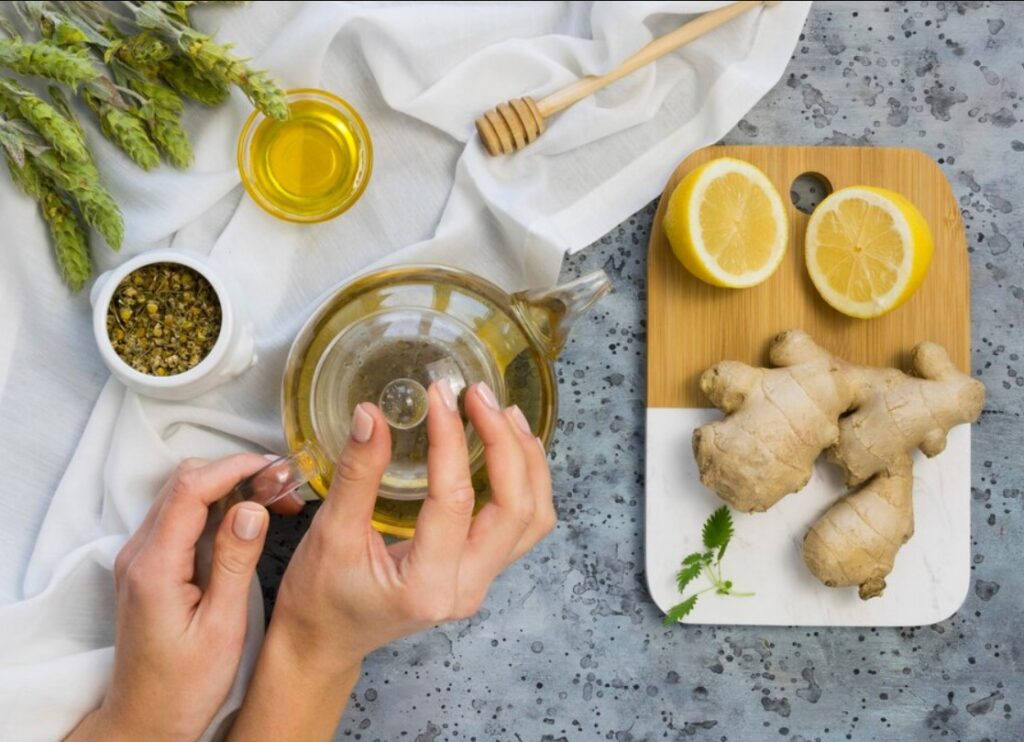Few things are as uncomfortable as a sore throat that makes swallowing painful or a stuffy nose that won’t let you breathe. Whether it’s the constant coughing, the nagging congestion, or the overall fatigue, colds can leave us searching for relief.
For centuries, ginger tea has been a trusted natural remedy for these common ailments. With its soothing warmth and potent healing properties, ginger has been celebrated in traditional medicine and is now supported by modern science.
We’ll explore how ginger tea can help alleviate sore throats, ease coughing, reduce congestion, and even provide relief for tonsillitis symptoms. Plus, we’ll share an easy recipe to make your own comforting cup at home.
The Science Behind Ginger and Its Benefits
Ginger has long been valued for its medicinal properties, especially when it comes to fighting off colds and soothing sore throats. But why is ginger so effective? Its power lies in its unique combination of natural compounds, including gingerol, shogaol, and paradols, which offer a range of health benefits.

Anti-inflammatory and Antimicrobial Properties
One of the primary reasons ginger is effective against colds and sore throats is its potent anti-inflammatory properties. When your throat is sore or swollen, ginger can help reduce inflammation and ease discomfort. Additionally, its antimicrobial properties may help fight off bacteria and viruses, which are often the culprits behind colds and throat infections.
This raises the question: does ginger help when sick? Studies suggest that ginger not only helps soothe symptoms but may also aid in shortening the duration of illnesses by targeting the underlying causes.
A Natural Decongestant
For those struggling with congestion, ginger is a natural decongestant that can help clear blocked sinuses. Its warming properties promote better circulation and open up the airways, making it easier to breathe. When you’re asking, is ginger good for congestion?, the answer is a resounding yes!
Immune System Support
Ginger is also known to boost the immune system, helping your body fight off infections more effectively. Its antioxidants work to reduce oxidative stress, which can weaken the immune response. So, if you’re wondering, does ginger kill colds?, while it may not be a cure, it certainly provides your body with the tools to recover faster.
By incorporating ginger into your diet—especially in the form of tea—you’re giving your body a natural and effective way to combat sore throats, colds, and congestion.
How Ginger Tea Helps Soothe a Sore Throat
When it comes to soothing a sore throat, ginger tea is a comforting and effective choice. The combination of warm liquid and ginger’s natural healing properties provides quick relief and addresses the root causes of discomfort.
The Soothing Warmth of Ginger Tea
The warmth of tea itself is therapeutic. Drinking a hot beverage can ease throat pain by relaxing inflamed tissues and increasing blood flow to the affected area. When ginger is added, the benefits are amplified. Ginger’s anti-inflammatory compounds, particularly gingerol, work to reduce swelling in the throat, relieving pain and irritation.
This dual effect makes ginger tea especially beneficial for sore throats caused by colds or overuse of the voice. The warm liquid also keeps your throat hydrated, which is essential for healing.
Reducing Coughing and Loosening Mucus
A persistent cough often accompanies a sore throat, and ginger tea can help with that, too. Ginger is a natural expectorant, meaning it helps to loosen and thin mucus. This makes it easier for your body to clear out phlegm, which can clog your airways and exacerbate coughing.
Additionally, ginger’s soothing effect on the throat can calm the irritation that triggers coughing. By combining the heat of tea with ginger’s active compounds, you create a remedy that not only alleviates the urge to cough but also addresses the underlying causes of congestion and throat discomfort.
Drinking ginger tea regularly when you’re sick can help you manage both the pain and the symptoms of a sore throat while promoting faster recovery.
Other Benefits of Ginger Tea for Cold Symptoms
Beyond soothing sore throats and calming coughs, ginger tea offers a range of additional benefits that make it a powerful natural remedy for cold symptoms. Its active compounds target multiple areas of discomfort, providing relief and promoting recovery.
Reducing Congestion
Congestion is one of the most frustrating symptoms of a cold, but ginger tea can help clear it up. Ginger’s natural warming properties stimulate circulation, which helps open up nasal passages and sinuses. Additionally, its decongestant effects help reduce mucus buildup, making it easier to breathe.
Research supports ginger’s effectiveness as a decongestant. Studies have shown that its anti-inflammatory properties help reduce swelling in nasal tissues, providing relief from blocked airways. So, if you’re wondering, is ginger good for congestion?, the answer is a definitive yes!
Alleviating Tonsillitis Symptoms
Tonsillitis, or inflammation of the tonsils, often comes with symptoms like a sore throat, difficulty swallowing, and general discomfort. Ginger tea’s antimicrobial properties may help combat the bacteria or viruses responsible for tonsillitis while its anti-inflammatory effects ease swelling in the throat.
Anecdotal evidence from traditional medicine practices has long supported ginger’s use for throat-related ailments, including tonsillitis. Although more clinical studies are needed, many people report significant relief from symptoms after drinking ginger tea.
Relieving Overall Discomfort
Ginger tea doesn’t just target specific symptoms—it also helps you feel better overall. Its warming effect can reduce chills, while its natural pain-relieving properties may alleviate headaches or body aches often associated with colds.
Moreover, ginger’s ability to support the immune system ensures that your body can fight off the illness more effectively, helping you recover faster. Its antioxidants work to combat oxidative stress, which can weaken your immune defenses during illness.
Supporting Evidence and Tradition
While modern studies continue to explore the full range of ginger’s benefits, traditional medicine has long relied on ginger as a remedy for cold symptoms. In Ayurvedic and Chinese medicine, ginger is regarded as a “heating” herb that promotes healing and balances the body.
Drinking ginger tea regularly during a cold not only reduces specific symptoms like congestion and throat pain but also helps restore comfort and energy, making it a must-have remedy for your wellness routine.
Precautions and Side Effects
While ginger tea is a natural and effective remedy for sore throats and colds, it’s important to be mindful of potential downsides. Though generally safe for most people, excessive consumption of ginger or individual sensitivities can lead to some unwanted effects.
Potential Throat Irritation
Although ginger’s anti-inflammatory properties can soothe a sore throat, consuming too much ginger—especially in concentrated forms—can have the opposite effect. Its spicy and warming nature may irritate the throat lining, causing discomfort instead of relief. This is particularly true for people with sensitive throats or those who consume ginger in raw or undiluted forms.
Digestive Issues
Drinking ginger tea in large amounts may cause digestive issues like heartburn, gas, or stomach upset. For some individuals, the spiciness of ginger can trigger acid reflux, which can further irritate the throat.
Allergic Reactions
In rare cases, some people may be allergic to ginger. Symptoms of an allergic reaction can include itching, swelling, or difficulty breathing. If you experience any of these symptoms after consuming ginger tea, it’s important to stop immediately and seek medical attention.
Interaction with Medications
Ginger may interact with certain medications, including blood thinners, diabetes medications, and high blood pressure drugs. If you’re taking any of these, consult a healthcare provider before using ginger tea as a remedy.
Moderation is Key
To avoid potential side effects, it’s best to consume ginger tea in moderation. One to two cups per day is generally safe for most people. If you’re using fresh ginger, limit your intake to about 1–2 grams of ginger root daily.
By being mindful of these precautions and using ginger tea responsibly, you can enjoy its many benefits while minimizing the risk of side effects. If you have ongoing throat discomfort or severe symptoms, consult a doctor to ensure the underlying cause is properly addressed.
How to Make Ginger Tea for Sore Throat Relief
Making ginger tea at home is simple and requires just a few ingredients. The combination of ginger’s healing properties with other natural ingredients like honey and lemon creates a soothing drink that can ease sore throat discomfort and support recovery.

Simple Ginger Tea Recipe
Ingredients:
- 1–2 inches of fresh ginger root
- 2 cups of water
- 1–2 teaspoons of honey (optional)
- 1 teaspoon of fresh lemon juice (optional)
Instructions:
- Prepare the Ginger: Peel the ginger root and slice it into thin pieces or grate it for stronger flavor.
- Boil the Water: Bring 2 cups of water to a boil in a small pot or kettle.
- Simmer the Ginger: Add the ginger slices to the boiling water, reduce the heat, and let it simmer for 10–15 minutes.
- Strain and Serve: Strain the tea into a mug to remove the ginger pieces.
- Add Honey and Lemon: Stir in honey and lemon juice for added flavor and extra soothing effects.
Tips to Enhance Effectiveness
- Add Turmeric: Boost the anti-inflammatory power of your tea by adding 1/4 teaspoon of ground turmeric or a small piece of fresh turmeric root to the water while simmering.
- Include Cinnamon: For a warming, comforting twist, add a cinnamon stick or a pinch of ground cinnamon. Cinnamon also has antimicrobial properties that complement ginger’s benefits.
- Try Black Pepper: A pinch of black pepper can enhance the absorption of ginger’s active compounds and add a spicy kick to your tea.
- Use Fresh Ginger: While ginger powder works in a pinch, fresh ginger root provides the most potent flavor and health benefits.
Pro Tips
- Adjust the ginger quantity based on your taste preference. If you’re new to ginger tea, start with a smaller amount to avoid an overpowering flavor.
- Store extra ginger tea in the refrigerator for up to 2 days and reheat as needed.
- For an added cooling effect on the throat, let the tea cool slightly before drinking.
By customizing your ginger tea with these simple variations, you can tailor it to your taste and maximize its soothing and healing properties. This comforting drink is an easy way to find relief from sore throats and cold symptoms.
Conclusion
Ginger tea is a time-tested natural remedy that offers numerous benefits for sore throats and colds. Its anti-inflammatory and antimicrobial properties can soothe throat pain, reduce coughing, and help clear congestion. By loosening mucus, easing tonsillitis symptoms, and boosting the immune system, ginger tea provides holistic relief from many cold-related discomforts.
Beyond its medicinal effects, the warmth and comfort of ginger tea make it a go-to remedy for anyone feeling under the weather. Whether you enhance it with honey, lemon, turmeric, or cinnamon, a steaming cup of ginger tea can be both healing and enjoyable.
While ginger tea is a safe and effective remedy for most people, it’s important to consume it in moderation and consult a healthcare professional for severe or persistent symptoms. Incorporating ginger tea into your wellness routine may be just what you need to feel better faster.
So, why not brew a cup today and experience its soothing benefits for yourself? Your throat—and your taste buds—will thank you!


